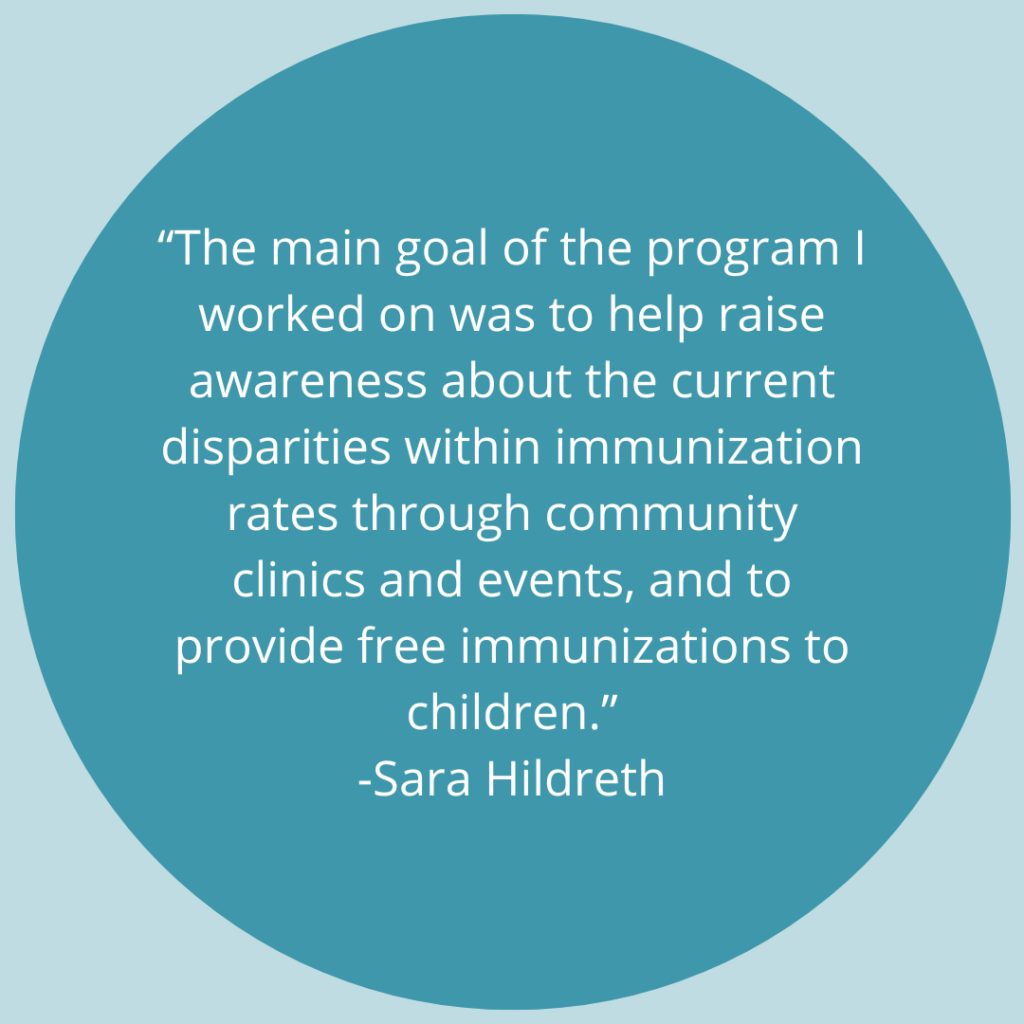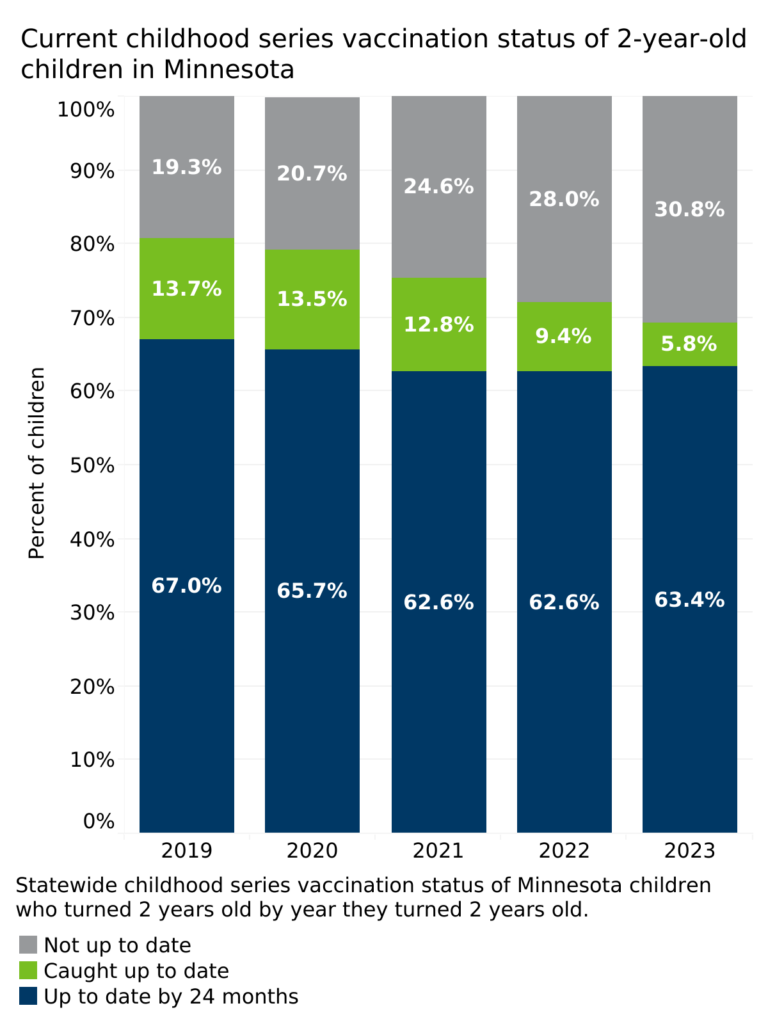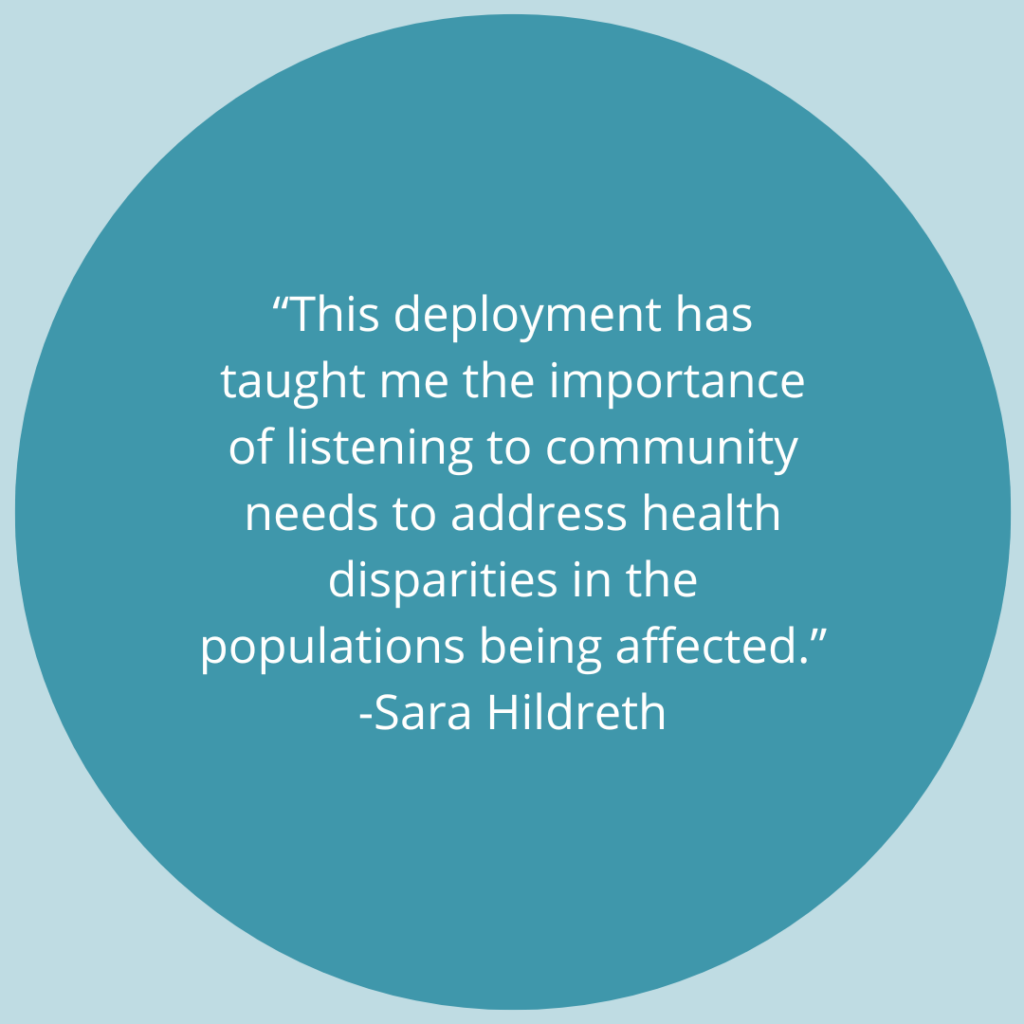#UMNMCH student Sara Hildreth (she/her, MPH 2024) reflects on her deployment experience with Hennepin County’s Babytracks and Immulink programs, which seek to address current disparities in infant vaccination rates. Sara helped develop surveys to understand the potential role of doulas in providing vaccine education. She also spearheaded the planning of many community events and clinics to provide vaccine education and administer immunizations. This April, they will be hosting their National Infant Immunization Week Health Childhood Event for community members in partnership with state, county, and community-based organizations.
My Path to the UMN MPH in MCH Program
I began my undergraduate school enrolled as a chemistry major before even starting college. I was an actress and public speaking competitor for the past four years, so that led me to audition for the theater program at UMD which I got into and subsequently changed my major. I then quickly panicked as the structure and outcome of the theater program, although great, was not for me. Eventually, I switched to psychology and honestly thought about as many majors as there were offered at the University. I couldn’t fathom fitting my creative side, curious side, and science side all in one major. Fast-forward, to my sophomore year, my advisor gave me the Public Health major packet, and safe to say, it stuck.
I graduated from the University of Minnesota Duluth with a Bachelor of Science in Public Health in 2022, with minors in Psychology and Women, Gender, and Sexuality studies. I interned with Everyday Miracles, a community organization dedicated to reducing disparities in birth outcomes, and used this experience to complete my Undergraduate Research Opportunities Program (UROP) project on Culturally Congruent Doula care. After these two experiences, my interest in community engagement sparked alongside the desire to continue working with the maternal population.
My UROP project was sparked after conversations with my team at Everyday Miracles as well as my mentor, Dr. Jessica Hanson, at the University of Minnesota Duluth. We had a lot of data at Everyday Miracles and I was eager to learn more and do something tangible with it. I went ahead and crafted a proposal on Culturally Congruent Doula care by analyzing our birthing statistics of BIPOC birthing people by comparing those with a doula that did not match their cultural background to those that had a doula with the same cultural background. For example, was a Somali birthing person more likely to have a c-section if their doula was white? Through analysis, we were able to determine that individuals who were paired with someone of the same cultural experiences were more likely to have a vaginal birth and less likely to utilize birthing interventions such as pitocin. I would love to revisit this project and publish a paper on it with my new knowledge from the SPH Maternal and Child Health program and experience at Everyday Miracles.
At Everyday Miracles, I am currently the community engagement and communications coordinator. I am responsible for a multitude of projects including engaging donors, representing our online presence as head of marketing, forming partnerships with other organizations, and overseeing the volunteer program. I started with this organization as an unpaid intern in 2020 and I am moving onto my 4th year. I am excited to establish my position there after graduation as a full-time employee!
My favorite part about Public Health is how it encapsulates my need for growth and variety. I can utilize my creative side to craft posters, write a research proposal, calculate statistics, and have meaningful complex conversations with all individuals. The spectrum of topics and multidimensional models of public health easily sustains my abundance of interests, and I am so excited to keep learning.
My Deployment with the Babytracks and Immulink Programs
My deployment was with the Hennepin County Babytracks and Immulink programs. These programs seek to keep babies up to date on immunizations and correctly track immunization records through Minnesota Immunization Information Connection (MIIC). I’ve worked alongside Marie Maslowski, supervisor of the Babytracks and ImmuLink programs, to plan, implement, and evaluate immunization clinics as well as develop vaccine hesitancy surveys for healthcare professionals to inform future programming. The main goal of the program I worked on was to help raise awareness about the current disparities within immunization rates through community clinics and events, and to provide free immunizations to children. We focused on children within the Hennepin County cities who were behind on routine immunizations or had not received any immunizations at all.
Vaccine hesitancy is defined as complex, inconsistent, and mistrusting attitudes that are vaccine-specific.1 Although it isn’t a new phenomenon, it is now a pressing global issue. Vaccine hesitancy was noted as one of the top 10 global health threats by the World Health Organization (WHO).2 Social platforms and general online communication have exacerbated the decline in childhood immunizations by spreading misinformation.
L.I.F.E. Framework
How are our actions relevant to specific populations?
Childhood immunizations are rebounding after a decrease during the initial COVID-19 pandemic, but they are rebounding unevenly amongst different groups of children. They differ by cultural background, age, and socioeconomic status. A main action within Hennepin County is to engage marginalized populations that are behind on their immunizations and gather information as to why. Once identified, we are able to work with these populations to provide access to vaccinations or resources to find immunizations that are accessible and free. Main barriers we identified were cost and accessibility along with an overall lack of trust in providers.
In Minnesota, vaccines and vaccine series administration has decreased in children 0-2 from 19.3% of children not-up to-date in 2019 to 30.8% today. Vaccine series are immunizations that require more than one dose. For example, the COVID-19 immunization series requires multiple doses of the shot to be most effective. Another main area of focus my team was dedicated to is the Measles vaccine. In Minnesota, we had 0 cases of measles in 2019 but in 2022 we experienced 22 cases. Measles is a viral infection that spreads easily through respiratory droplets and even surfaces, but it is completely preventable with the Measles vaccine.
Vaccines are among the most successful and cost-effective public health tools available for preventing disease and death! The goal within Minnesota for series vaccines is to reach 90%, and we currently sit at 63%. This goal refers to the seven vaccines essential for a healthy childhood including DTaP, polio, MMR, Hib, Hepatitis B, varicella, and PCV, and these were the primary vaccination targets I worked on. This topic was all new to me within these past years, when I first dove into Infectious Disease as a Maternal and Child Health major. I paired this learning with Infectious Disease Epidemiology with Professor Kumi Smith. This course gave me substantial knowledge to go alongside this deployment.
National Infant Immunization Week
After researching and working alongside the Epidemiology team to pinpoint cities within Hennepin County with lower immunization rates, we decided to staff and provide free vaccination and information clinics, kicking it off with our main event, The National Infant Immunization Week Health Childhood Event. I am responsible for spearheading the planning and evaluation of this event alongside the Babytracks team. We first piloted the event last year in April 2023, and due to the success, we are excited to put it on again. The event for this year is taking place Saturday, April 27th from 11-3 PM at the Brookdale Public Library! Contact Sara Hildreth (Hildr047@umn.edu) if you would like to volunteer or know an organization that would be interested in attending.
To begin planning this event, I worked with my supervisor to seek out free sites where we could host immunization clinics. This included contacting other county organizations that held prior clinics to see what they would recommend, and learning from sites if they allowed clinics to happen. I then began to reach out to organizations and filled my schedule with meetings to recruit educators, non-profit organizations, nurses, and community members to attend. The organizations I reached out to included those that may tie in with the theme of a healthy childhood or were directly related to vaccines in childhood.
I have partnered with multiple organizations such as Health on the GO, Voices for Vaccines, the Child and Teen Checkups program, WIC, Hennepin Healthcare, and more! I have had the chance to meet with many established public health organizations, non-profits, and supervisors to encourage attendance at our event. This has broadened my horizon of leadership by working with different communities and systems.
The Role of Doulas
Alongside planning and recruitment for the National Infant Immunization Event, I surveyed doulas within Hennepin County. Doulas are non-medical birth professionals known to support birthing people physically, emotionally, and most importantly, be advocates for their desired birthing experience. As a non-medical professional, I was interested in exploring what potential roles they could play in providing immunization education. In 2023, Ruth Arévalo, who worked alongside me in this deployment in 2022-2023, and I developed a Healthcare Provider Survey. The purpose of this was to evaluate how different providers who work with infants and birthing people provide immunization education. We also included measures regarding vaccine hesitancy. Vaccine hesitancy can be defined as a complex view of knowledge, information/misinformation, and policies all regarding vaccines.
This survey was sent out only to doulas in January 2024 to gather overall evaluation data on their role in immunizations, especially as non-medical professionals. Out of our responses gathered so far, answers varied widely. Shown below are four main questions that provide important insight into doula’s perspectives on providing immunization education for their clients:
Do you believe it is your role to provide childhood vaccine education to parents?
- 59% said yes
- 41% said no
Do you believe you have enough information and facts for parent discussion on Facts about childhood vaccines?
- 56% yes
- 44% no
In general, do you believe parents are informed on childhood vaccinations?
- 38% yes
- 62% No
In general, do you believe parents are accepting of vaccinations?
- 87% Yes
- 13% No
Project’s overall end goal
The overall goal is to provide and promote infant immunizations and resources for free to all individuals interested within Hennepin County. I was also able to develop a sustainable National Infant Immunization Week event that can easily be replicated every year. It was challenging yet exciting to coordinate this event and I cannot wait to watch it improve throughout the years. After my deployment, I will create a packet on how to plan this event so the team can continue to run this in the future. This deployment has taught me the importance of listening to community needs to address health disparities in the populations being affected. I hope to utilize this framework in my future professional career.
References
1. Larson HJ, Gakidou E, Murray CJL. The Vaccine-Hesitant Moment. Longo DL, ed. N Engl J Med. 2022;387(1):58-65. doi:10.1056/NEJMra2106441
2. World Health Organization. Ten threats to global health in 2019. World Health Organization. Published 2019. Accessed April 1, 2024. https://www.who.int/news-room/spotlight/ten-threats-to-global-health-in-2019
3. Minnesota Department of Health. Pediatric Immunization Gaps Due to the COVID-19 Pandemic. Minnesota Department of Health. Published February 27, 2024. Accessed April 1, 2024. https://www.health.state.mn.us/people/immunize/hcp/vaxpan.html
BIO
Sara Hildreth will graduate in Spring 2024 with an MPH in maternal and child health and a minor in sexual health, Sara received her BASc in Public Health from the University of Minnesota Duluth in 2022. She currently works as the Communication and Engagement Coordinator for Everyday Miracles, a non-profit organization that provides doula care, childbirth education, and car seats & breast pumps. She is also an intern for the Midwest Perinatal Substance Use Workforce Development Project, where she develops communication materials for healthcare professionals relating to perinatal substance use. In her spare time, she enjoys adventuring with her dog Willow, reading, and spending time in the kitchen. After graduating, Sara hopes to continue to immerse herself in the multidimensional world of public health through research, doula work, public health communication, and much more!
–Read Student Spotlight archives
Interested in learning more about getting a degree in MCH? Visit our MCH Program page for more information.
#UMNMCH #UMNproud #UMNdriven



